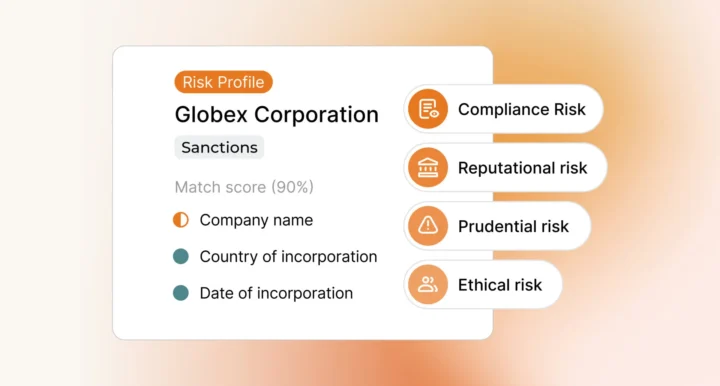One of the wealthiest countries in Europe and the world, France has an economy that attracts diverse business interests, including international banks and fintechs. Unfortunately, the prominence of its economy also makes France a target for criminals, who seek to launder money, finance terrorist activities, and commit financial crimes.
In response to that criminal threat, the French government imposes a range of strict anti-money laundering (AML) and counter-financing of terrorism (CFT) regulations on its financial institutions. In order to avoid compliance penalties and contribute to the fight against financial crime, firms operating in France should understand how to meet those compliance obligations efficiently.
Who are France’s Financial Regulators?
France has established a number of financial supervisory authorities. These include:
Autorité des Marchés Financiers
The Autorité des Marchés Financiers (AMF) is France’s main financial supervisory authority and is responsible for regulating the country’s “financial marketplace, its participants, and the investment products distributed via its markets”. The AMF has the authority to “monitor and where necessary, inspect, investigate and enforce” in order to ensure that firms within French jurisdiction operate in compliance with financial regulations. The AMF also participates in the development of AML/CFT regulations in Europe, and plays a role in the European Securities and Markets Authority (ESMA).
Autorité de Contrôle Prudentiel et de Résolution
An independent administrative authority, the Autorité de Contrôle Prudentiel et de Résolution (ACPR) is responsible for regulating France’s banking and insurance businesses under the direct authority of the Banque de France. Like the AMF, the ACPR focuses on protecting France’s financial stability by monitoring compliance with AML/CFT regulations, maintaining a dialogue with financial sector organisations, and representing France in global financial organisations.
Traitement du renseignement et action contre les circuits financiers clandestins
The Traitement du renseignement et action contre les circuits financiers clandestins (TRACFIN) operates under the authority of the French Ministry of Finance. Its mission is to maintain the health of the French economy by fighting against financial crime, money laundering and the financing of terorism. Under that remit, TRACFIN is responsible for the analysis and investigation of suspicious activity reports submitted by French financial institutions.
Financial Action Task Force
As a member of the Financial Action Task Force (FATF), the French government transposes FATF guidance into domestic legislation, to be enforced by financial authorities such as the AMF. Accordingly, firms in France must take certain fundamental regulatory steps to achieve regulatory compliance, including developing an AML/CFT solution, taking a risk-based approach to AML/CFT, and appointing a money laundering officer responsible for overseeing internal compliance processes and communicating with financial authorities.
What are France’s Key AML/CFT Regulations?
French AML/CFT compliance involves the following key regulations and controls:
French Law: The French Monetary and Financial Code and the French Criminal Code criminalise money laundering and terrorism financing in France.
The AMF General Regulation: The General Regulation sets out the AML/CFT compliance rules that all French institutions must follow. The AMF regularly updates the general regulation to incorporate changes to French and European law.
AMF Recommendations: The AMF periodically releases specific guidance on aspects of AML/CFT laws. Recent AMF recommendations include:
- AMF Doc-2019-15: Guidance on implementing a risk-based approach to AML/CFT.
- AMF Doc-2019-16: Guidance on establishing beneficial ownership.
- AML Doc-2019-17: Guidance on screening for politically exposed persons (PEP).
- AML Doc-2019-18: Guidance on the reporting of suspicious activity to TRACFIN.
The Sixth Anti-Money Laundering Directive: As an EU member-state, France must implement the anti-money laundering directives (AMLD) which are updated regularly to ensure regulatory parity across the continent. The latest directive is the Sixth Anti-Money Laundering Directive (6AMLD) which came into effect on 3 June 2021 and introduced the following key regulatory changes:
- A harmonised list of 22 money laundering predicate offences, including the two new predicate offences of environmental crime and cyber-crime.
- An expansion of the definition of money laundering to include aiding and abetting.
- An extension of criminal liability for money laundering to include legal persons such as companies – effectively ensuring management employees share responsibility for the criminal actions of individual employees.
- Increased punishments for money laundering, including a minimum prison sentence of four years.
- The introduction of information sharing requirements between different EU jurisdictions to better facilitate criminal convictions.
How to Comply with French AML Regulations
AML compliance should be a significant priority for firms in France. Under the risk-based approach, firms must conduct risk assessments of individual customers and implement automated software systems capable of managing the data collection requirements of French AML regulations. In practice, an effective AML/CFT solution in France involves:
- Customer identification: Firms should conduct suitable customer due diligence (CDD) to identify their customers and build accurate risk profiles.
- Beneficial ownership: Firms should conduct beneficial ownership checks to ensure that customers are not using corporate structures or shell companies to disguise money laundering.
- Transaction screening: Firms should screen customer transactions against relevant lists and registers – including politically exposed persons (PEP) lists, beneficial ownership registers, and international sanctions lists, such as the EU’s consolidated list.
- Adverse media screening: Changes in customer risk profiles may be reported in media sources before they are confirmed by official sources. With that in mind, firms in France should implement an adverse media screening solution to capture stories from around the world that involve their customers.
Recent AML/CFT Developments in France
The AMF publishes the latest updates to French AML/CFT regulation on its news page. Key recent developments include:
- MiCA: In July 2022, the AMF publicised the provisional agreement on the EU’s new crypto regulatory framework, known as Markets in Crypto Assets (MiCA). The framework will regulate crypto-assets and stablecoins across the bloc, along with new compliance requirements for cryptocurrency exchanges. The framework will replace France’s existing PACTE law.
- ESG data: In June 2022, the AMF reiterated its call for a Europe-wide regulatory framework for environmental social and governance (ESG) data. The call reflects the increasing significance of ESG data in financial risk management. The AMF suggested that a centralised EU ESG data resource would guarantee “harmonised supervision”.
- Ukraine sanctions: Following Russia’s unprovoked invasion of Ukraine, the AMF publicised guidance for French firms regarding the enforcement of sanctions against Russia and against Russian individuals. In April 2022, the AMF issued guidance on new economic sanctions against Russia which directly affected French asset management companies.
Next Generation Compliance
Our Labyrinth Screening platform enables firms in France and around the world to enhance their AML/CFT compliance performance. Labyrinth Screening incorporates next generation machine learning technology to match customer names across thousands of global data sources, including PEP lists, sanctions lists and adverse media sources, in 21 languages. Use our cutting-edge risk management technology to adapt to new regulations and emerging risks in a challenging global landscape.
Contact us to discuss how Ripjar can support your AML compliance in France
Last updated: 16 August 2024





